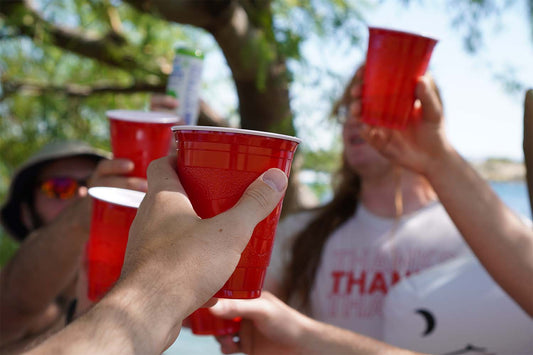Setting up everything for your big event is always overwhelming. There are so many new terms to learn, people to talk to, and moving parts to coordinate.
We wouldn’t be surprised if you wanted to make yourself a drink after a day of planning.
Let us help you out a little. Let’s discuss different types of bars you can have at your event and the pros and cons of each of them.
Remember that no matter what kind of bar you choose, everyone should drink responsibly.
What Is a Hosted Bar?
A hosted bar is when you pay for all the guests’ drinks. You pay after the event is done, and the amount of alcohol poured or bottles used are calculated for the bill.
Pros of a Hosted Bar
- People like free alcohol
- You pay for exactly what people drink
- No long lines because bartenders are just serving, not dealing with money
- Some people see this style of bar as a “Thank You for Coming”
Cons of a Hosted Bar
- People like free alcohol
- Can get expensive fast
- You may be surprised by the bill amount after the event
- Drunken mishaps could happen
What Is a No Host Bar?
A no host bar, also known as a cash bar, is when guests pay for their own alcoholic drinks. They can order whatever they like, but again, they have to pay for it.
You have to make sure you let guests know ahead of time that this is the only kind of bar available so they can bring cash.
Pros of a No Host Bar
- Saves you money
- Could prevent drunken mishaps
- Could put money that would have been used for drinks into something else
Cons of a No Host Bar
- Some people find this style of bar tacky
- Long wait lines because bartenders are serving and handling money
- People do not like having to pay for drinks
Are There Any Other Styles of Bars for Events?
Maybe neither of these choices appeal to you, and that’s okay. You have a few more options to pick from.
Open Bar
Open bars and hosted bars are often confused, but there is a significant difference. Open bars are charged by the hour. There may also be a bartending rate depending on where you are holding your event. You also pay before the event.
The amount you’re charged can change depending on what kind of alcohol you’re serving.
Pros of an Open Bar
- People love free alcohol
- There are no wait times because bartenders will just be serving and not handling money
- You pay beforehand
- Some people see this style of bar as a “Thank You for Coming”
Cons of an Open Bar
- People love free alcohol, and you’ll be paying for that free alcohol
- There could be some drunken mishaps
Limited Bar
A limited bar is where you choose what kind of alcohol will be served. You limit the kinds and brands that are offered.
A limited bar can be cash or open, whichever works for you.
Pros of a Limited Bar
- Can save you money
- Still get to be a good host
- Control over what’s being served
- Minimize any drunken mishaps
Cons of a Limited Bar
- People may be mad it’s limited
- Still can cost money (if you host it)
- Another decision you have to make
- People may not like what you chose
Subsidized Bar
A subsidized bar is when you partly pay for drinks and guests partly pay for drinks. Financially, it’s a nice middle-ground for everyone’s budget.
You can pay for the first couple of hours, and then guests will pay for the rest of the event. You can cover costs for specific drinks, and if someone wants something different, they have to pay for it themselves. You can also set a dollar amount limit, and once that limit is reached, it’ll turn into a cash bar.
Not every venue will be able to do this type of bar, so make sure you ask all venues you’re interested in what kind of bar packages they offer.
Pros of a Subsidized Bar
- Save money
- Still be a good host
- Minimize drunken mishaps
Cons of a Subsidized Bar
- People may still be mad that they have to pay
- Still takes money out of your budget
- Venues may not be able to do this style of bar
Mesh Different Styles of Bars Together
If certain aspects of different bar types appeal to you, there’s nothing wrong with meshing some different bar styles together.
As mentioned before, limited bars can be open or cash. That’s an example of mixing styles.
You can have a subsidized bar that has no limits on what kind of alcohol is available and instead focus on time or dollar amount to be the limit.
You can do a limited host bar. You could offer tickets for the first couple of drinks and then have it be a cash bar. Though with tickets, make sure everyone gets the same amount. You don't want any hurt feelings.
What Bar Style Is Best for You?
That’s hard to answer; you have to decide for yourself. There are a few factors you should consider while deciding.
What Will Your Venue Allow?
The first thing to consider is what your venue will allow. Do they offer different options for bar packages?
If they don’t, is your heart set on this venue? Are you willing to shuffle your budget around to make it work?
Your venue choices and their options will significantly alter the decisions you can make.
What Options Do You Have With Your Caterer?
Sometimes caterers offer alcohol packages along with food. You should see if your caterer does this and if any plans work for you.
What Are Your Guests Like?
Guests are probably the second biggest factor when it comes to choosing the type of bar and the amount of alcohol you want at your event.
How many guests are you going to have? How many are of drinking age? How many love to drink alcohol?
If you have a group of moderate drinkers, a hosted bar would be fine. If you have some heavy drinkers or people who like expensive alcohol and you’re trying to keep costs down, a no host bar would probably be better.
How Long Is Your Event?
The kind of bar you choose can change depending on how long your event is. If it’s all day, a no host bar may seem rude since you’re taking your guests’ whole day. However, a limited or subsidized bar may work out.
If your event is only a couple of hours, an open or hosted bar may be expected. At the same time, you may not get as much blowback for having a cash bar if it’s only a couple of hours.
When Is Your Event?
The time of day and year can also affect the kind of bar you want to have. If you’re having your event during the evening with a meal, people may drink less than if you had it in the afternoon.
Warmer weather encourages more drinking than colder weather, so it’s important to keep that in consideration.
Are You Going To Have Any Mixed Drinks or Cocktails?
Depending on this answer, you may be able to get away with offering more basic alcohol versus the high-end stuff. If you’re hosting a wedding, you could even offer an apéritif cocktail that’s special to you and your partner.
Also, make sure your caterer or venue can make the mixed drinks or cocktails that you want. It would be terrible to find out they can’t when it’s too late to do anything about it.
Can You Bring Your Own Alcohol?
Depending on the venue you have, you may be able to bring your own alcohol.
Why would you want to do that? Well, bringing your own alcohol could help you save some money because you don’t get charged by the caterer or the venue.
If you go this route, you’ll probably have to provide ice, a bartender, and garnishes. Make sure to include all that when you’re making calculations.
The venue might not let you do this, though, because there are different legal and licensing regulations depending on where you are.
What Kind of Bar Do You Want?
As we’ve said before, it’s your event, so you should do what you want. You can’t please everyone, so make sure you make yourself happy.
All these styles of bars have their pros and cons. The only way one is better than the other is if one is better suited for your event than the others.
We know this is a lot of information and that you’re probably overwhelmed. We hope we can help you, just a little bit.
Sources:
How Much Alcohol Do You Need for Your Wedding? | Brides
Is It Tacky to Have a Cash Bar at Your Wedding? Readers Weigh In | Glamour




